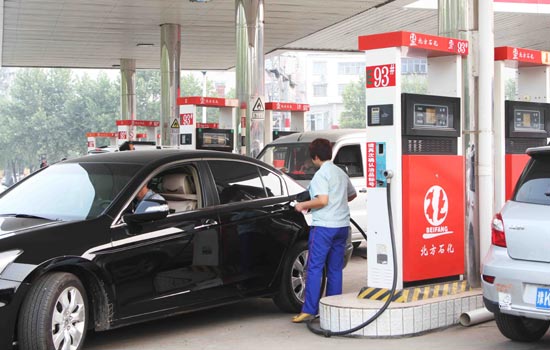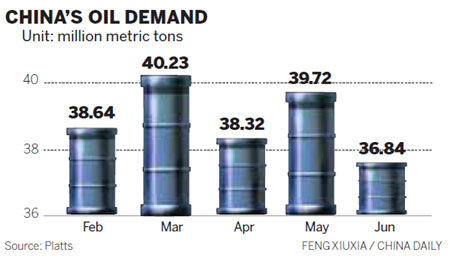
China's oil demand fell for the first time in three years in June with a 1.9 percent drop year-on-year to 36.84 million metric tons, or an average of 9 million barrels a day, according to analysis from New York-based energy and metals information provider Platts on Wednesday based on government data.
The country's daily oil demand in June fell 178,400 barrels a day from 9.18 million barrels a day in the same period last year, which is the first drop since a 2 percent decrease in the first quarter of 2009 in the wake of the global financial crisis, Platts said.
On a daily basis, apparent oil demand last month was at its lowest since September's figure of 8.95 million barrels per day.
|
 |
|
Drivers refill their cars at a gas station in Xuchang, Henan province. A Platts report said China's oil demand in June declined for the first time in three years, dropping 1.9 percent year-on-year to 36.84 million metric tons. [Photo/China Daily] |
Apparent oil demand is calculated on the basis of crude throughput volumes at domestic refineries and net oil product imports reported by the National Bureau of Statistics and Chinese customs, Platts said.
"Industry insiders have been expecting the drop to come because demand for fuel will definitely decline when economic growth slows," said Platts' senior writer for China Song Yen Ling.
China's apparent oil demand increased 0.3 percent to 9.35 million barrels a day in April and 0.5 percent to 9.39 million barrels a day in May.
However, the drop in June led the second quarter's daily oil apparent demand to drop 0.4 percent compared with the same period last year.
"Oil demand had a slight increase in the first half, and the one-month drop cannot show the whole picture of national demand in the long run," said Li Li, senior information manager at energy consultancy ICIS C1 Energy.
According to Platts, China's average daily oil apparent demand in the first half was 9.45 million barrels, up 1 percent year-on-year.
Li estimated that demand in the third quarter will stabilize at around 2 to 4 percent growth year-on-year.
"Since oil prices fell in May, the fuel markets, including coal and oil, have both suffered a period of high inventories, but the situation will improve," she said.
"Meanwhile, fuel prices will be uncertain in the second half because of both political and financial influence.
"In the second half of the year, it's going to be a tussle between the slowing economy and the government's efforts to get things back on track," Song said.
China's second-quarter GDP growth was 7.6 percent, 0.5 percentage point lower than the first quarter, the lowest in the past three years. Industrial output growth was 9.5 percent, compared with 12.1 percent in the last 12 months, and electricity generation decreased 0.9 percent year-on-year.
The most recent figures show coal consumption, which accounts for about 70 percent of the country's total energy use, grew 2.8 percent year-on-year in the first half, a 6.6 percentage point drop compared with last year's growth rate in the same period.
Jiang Zhimin, vice-president of China National Coal Association, said coal demand will continue to fall in the second half and the oversupply situation will worsen.
Earlier this year, the Economics and Technology Research Institute under China National Petroleum Corporation, the country's biggest oil producer, said in a report that domestic oil demand would grow 5 percent to 493 million tons in 2012. The growth rate is lower than the average in the past 10 years.
Meanwhile, the country's net crude oil imports will increase 6.4 percent to 266 million tons this year.
Net oil imports by China in 2011 rose 7.7 percent to 264 million tons.
The People's Bank of China cut the benchmark interest rates in early July, the second time in a month, in an effort to increase lending.
Signs that the stimulus efforts might be working came with a doubling of new loans from China's four biggest banks to 50 billion yuan ($7.9 billion) in the first half of July as compared with the first half of June, according to Platts.



 Washington to remain focused on Asia-Pacific
Washington to remain focused on Asia-Pacific RQFII target blue chips amid bear market
RQFII target blue chips amid bear market Australian recall for top two exporters
Australian recall for top two exporters China fears new car restrictions
China fears new car restrictions